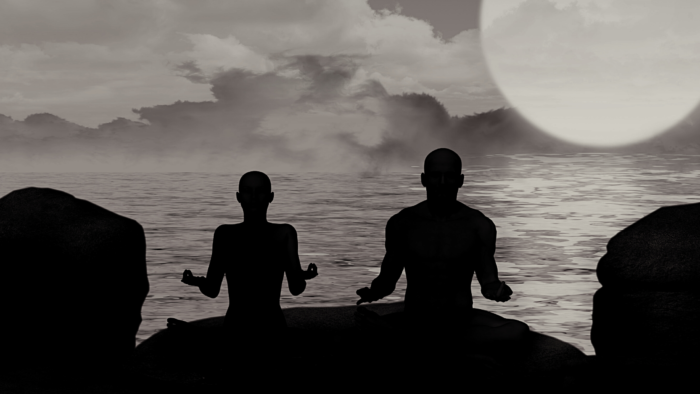This article is sourced from https://www.dlshq.org/messages/whymed.htm
With due credit to THE DIVINE LIFE SOCIETY, Rishikesh
The basic problem in the world today seems to be that there is no interest in meditation as such. It is partly the fault of people who preach and do propaganda for meditation. When you want to spread the practice of meditation and encourage people to take it up, you persuade them that there is some benefit in it. In order to do that the preachers suggest, ‘Practise meditation. You will be completely free of all tension.’ The moment that aspect enters the field of meditation, the whole practice is ruined. From there on you are not sitting completely relaxed, meditating, but you are tense, looking at the state of relaxation which the preacher suggested was your goal. Trying to reach out to it you become more tense.
The moment you introduce a goal to meditation, it is gone. Happiness in life comes not by manipulating what you want to achieve but by paying attention to something seemingly totally unconnected with it. In order to make the mouth laugh, you tickle the foot. This seems to be of fundamental importance. Concentration of mind is not achieved by concentrating the mind, but by going right round doing something completely different. That is actually what the great masters of yoga suggested when they said to sit down and repeat your mantra.
The problem is that our minds are in a terrible state of disorder, our attention is not steady at all. Physically we are tense, mentally we are distracted. We go to a teacher and he says—"Sit down and repeat a mantra." While you pay attention to the mantra, which is totally unrelated and unconnected with the problem you are really trying to solve, the problem gets dissolved. You don’t have to solve the problem, the problem can be dissolved. That is much simpler, otherwise when you have a problem and someone tells you to solve it, the solution becomes another problem! The confused brain creating another solution, is in worse confusion. The mind, after all, is one thing, not a supermarket. You are happy sometimes and you are unhappy sometimes. When you are unhappy, what happens to that happy person? And when you are happy, what happens to the unhappy person? Are you one or two? It is not difficult for you to see that you are one thing.
The mind is one substance which seems to assume several successively different disguises. It is not possible for the mind to be in two moods at the same time, and even when one is able to juggle the moods quickly, it only means that the mind is able to change very fast.
There is no more mystification about meditation than this. The master, by suggesting that you sit down and go on repeating a mantra, has made you temporarily forget your problem. A problem that is forgotten does not exist, unhappiness that is forgotten is happiness. It can come back again, but never mind. If you have been unhappy for 6 or 7 hours at a stretch, you have at least had 20 minutes of happiness. That is marvellous; the unhappiness was a mental state, nothing more than a mood.
In real life we see quite plainly that if an external situation was responsible for one’s unhappiness, that situation is not going to be changed by being unhappy. Therefore the yogi said "Free yourself from this external compulsion and realise that unhappiness is a mental mood." The mind substance is still there, it has temporarily assumed the form of unhappiness, the character of unhappiness. You can be sure that even if you are in the worst of all moods now, the sun is not going to be veiled because of you, it will still shine brilliantly. And if you shake off your bad mood and get into the sun, it is to your advantage. You have been unhappy before, you may be unhappy later—‘so what’! All the problems are there waiting outside—let them! For the next half hour sit down and say your mantra, and as you go on in this way, suddenly you discover that the unhappiness is not there any more. Suddenly you realise that you (or something in you) is totally independent of the happiness or unhappiness that the environment imposes upon you. Coming out of your meditation room you are able to say ‘so what’, right in front of the unhappiness that faces you again.
So it is possible to free yourself psychologically from external compulsion, external imposition. Sitting there in that room for half an hour you have tasted it. The mind being of one substance was fed with this mantra, or something totally unconnected with all worries and anxieties, happiness and unhappiness.
You have not been struggling, you have not been praying to God to please take this problem away. (That is useless—another one will come.) But in the meantime you have discovered that it is possible for you, without changing the external environment, to be happy within yourself. You taste it. The most important thing in meditation is not to try to solve the outside problem, but to taste the present mood of peace and joy and happiness that is flowing inside. Then when you come out you are able to face this problem.
I am not saying the problems we are surrounded by can ever be removed, but the inner attitude can be radically and instantly changed. It doesn’t even take half an hour. Meditation makes this possible by not dealing with the problem head on, but by turning the attention to something completely different (which happens to be beyond the source of all problems). This is not a policy of escapism. Let us take a very simple example of inter-personal conflict. You and he are working in the same organisation. You are saying something, he is saying something different, you have a little misunderstanding, a quarrel. He is too strong and powerful, so you don’t want to fight with him. You go into your meditation room, sit and repeat the mantra. After a short while everything is at peace within yourself—there is harmony and joy within you. Are you escaping? No, because you have got to come out and meet him, again. Then you are a completely changed person, you realise that conflict can be ended by ending it within yourself. There is a lovely expression: "You cannot clap with one hand." It needs two to make a quarrel, they say, but I feel "It needs only one to make a quarrel—me".
The yogi’s approach through meditation deals with the fundamental problem of human response. Once you have trained yourself in this technique (you can call it meditation or concentration) then it is possible for this to happen throughout the day, when there is need for you to respond. And though superficially it looks as if you are self-centred and selfish, you are not, because you have found the key to dissolving the problems and conflicts. That I think is the greatest contribution one can make to human happiness in society as a whole.
Half the problem connected with meditation springs from thinking about it. The thoughts that one may have about meditation are not meditation. It is possible to think about it, it is possible to talk about it and it is even possible to ‘do’ it, but none of these is meditation. Like sleep, it is something that has to happen, and one does not know when it is happening, but realises something has happened in retrospect. What is it that puts an end to sleep? What is it that puts an end to meditation? Strangely enough the desire to experience it.
We are trapped in a strange and delightful problem. We need to meditate but we cannot will ourselves into meditation. Meditation is vitally important not only to some of you who might be spiritual seekers, but also to people who want to become more alert in mind and in intellect, and even to people who pursue material goals. If meditation is a state in which there is no mental confusion, there is inner harmony and peace, then it is of vital importance to everybody. Whatever be your aspirations, whatever you are looking for—whether spiritual, intellectual, mental or material—one who knows what it is to meditate, or what it is to surrender oneself to meditation, realises that the key to any achievement is there. But fortunately or unfortunately, it is not possible to force it.
It is extremely fortunate that meditation cannot be made to happen, for the simple reason that if it could, it is liable to be marketed as we already see is being done, and what is even worse, it can be misused and abused. It is unfortunate because though we aspire for the state called meditation it seems to elude us and we are still groping. A few broad hints may be given, but even these are like preparing the bed as an invitation to sleep. You cannot ‘go to sleep’. It is an expression as inadequate and erroneous as all expressions are. Sleep has to come—you can only go to bed.





